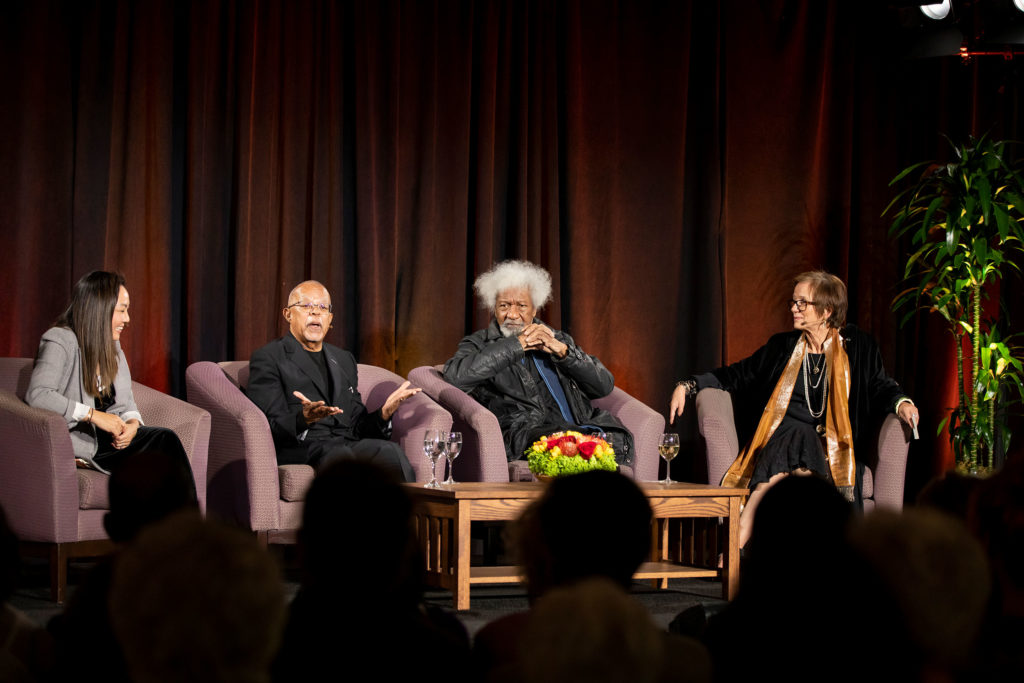
Put a Harvard professor and Nobel Prize-winner on the same bill, and you may bet, no matter what it’s called, that you’re in for a night of lectures. But when Henry Louis Gates Jr. and Wole Soyinka took the stage at the “Inaugural Global Conversation with Henry Louis Gates, Jr. + Wole Soyinka,” they turned it into an evening of storytelling. There were tales, and more tales—unscripted, humorous, occasionally raw, and revealing.
Gates, Harvard professor and host of PBS’ “Finding Your Roots,” and Soyinka, a Nobel Prize-winner for literature, were joined by LMU professors of English Julia Lee and Theresia de Vroom, who led the conversation with questions for their guests. Gates was mentor to Lee when she studied with him at Harvard University, and Gates himself sought out Soyinka as his tutor when he was enrolled at Cambridge University in the United Kingdom. Soyinka’s bond with de Vroom traces back to his stint as President’s Marymount Professor in Residence at the Marymount Center for Faith, Culture and the Arts, which de Vroom directs.
But if the evening was a demonstration of the impact of intellectual forebears, it also reflected the importance of family in shaping one’s life.
Lee and de Vroom asked about early memories, influences and mentors, and both speakers reached back into their rich past. Soyinka recalled an uncle (and father to Nigerian music legend Fela Kuti, Soyinka’s cousin), Israel Oludotun Ransome-Kuti, who was principal of Soyinka’s high school. The writer recalled him as a just, gentle yet intimidating man committed to community and tradition. A “disciplinarian,” said Soyinka, he was known to occasionally mete out punishments.
“He beat the living shit out of me,” Soyinka recalled. “It was both as principal and as my uncle [that] he had double right to beat me. And he didn’t lack for cause. But I loved him. I admired him a lot. He was musical, and he was fierce — a fierce anti-colonial.” That uncle was the inspiration for “Aké: The Years of Childhood,” Soyinka’s 1981 memoir of his childhood.
“I consider him my real ancestor,” Soyinka said.
Gates, when asked by Lee about early experiences that shaped him as a writer, said, “It took my many years to realize, but my first image of a writer was right under my nose in my own household: It was my mother.”
Gates grew up in West Virginia in the Potomac Valley, near Harper’s Ferry. His family on both sides had lived in the Potomac Valley for 200 years. His mother was the first Black person elected secretary of the Piedmont PTA. She wrote obituaries for Black people in the Potomac Valley. She’d read them as eulogies in church, Gates recalled.
“My mother,” Gates said, “had the capacity to name the person that you wanted to be in your heart before the world had prevented you from becoming that person.” It took him years, he said, “to realize that the compulsion I have for genealogy came from my mother doing people’s obituaries. That was [my] first glimpse assessing a life and doing a biography.”
de Vroom, who planned much of the event, described the evening as historic for LMU. “Both of these men have changed the world,” she said. “And here they were, on a stage together. I think that was extraordinary.”
The evening was made still more distinctive by the order of proceedings. Working with de Vroom, John Flaherty, director of liturgy and music and associate director of Campus Ministry, placed the conversation within a setting that included a welcome, introductory song, conversation, musical interlude, more conversation and a closing song. In other words, the gathering took place within a musical arc that, together with the words, transformed the event into a satisfying liturgy.
Flaherty has organized many public, ceremonial and religious events around the country. As a liturgy planner, Flaherty says he always begins his work with a series of crucial questions “Where are we going, where do we start, what are the important moments we want to hit, where are the peaks, where are the valleys, and where do we end up?”
Flaherty said he’d long hoped to plan an event like the Inaugural Global Conversation in the University Hall atrium, where he imagined changing a “big, empty space” into a place of intimacy. He oversaw the placement of lighting, chairs and even plants to bring warmth to a stark setting, and with music he linked the speakers and their roots with the audience.
Ayo Adeyemi & the Soul of Africa, an L.A.-based Nigerian ensemble, opened the evening with a song from Nigeria. Betty G, a popular Ethiopian artist and an UNHCR Goodwill Ambassador, offered “Birabiroye,” a song about hope for the future, as an interlude mid-way in the proceedings. Kim Harris, professor of theological studies in the Bellarmine College of Liberal Arts who lectures on spirituals and freedom songs, sang “I Believe I Will Go Back Home,” Gates’ favorite spiritual, along with the closer “Ain’t Gonna’ Let Nobody Turn Me ’Round.” Taken together, Flaherty said, the music represented the historical meeting of Africa and America that Gates and Soyinka embodied.
It was a night, Flaherty said, that reminded him of the words of Peter Hans Kolvenbach, S.J. (1928–2016), the late leader of the worldwide Society of Jesus, who said. “When the heart is touched by direct experience, the mind may be challenged to change.”
“Going Across Africa: The Inaugural Global Conversation with Henry Louis Gates, Jr. + Wole Soyinka” may be watched in its entirety on YouTube.
